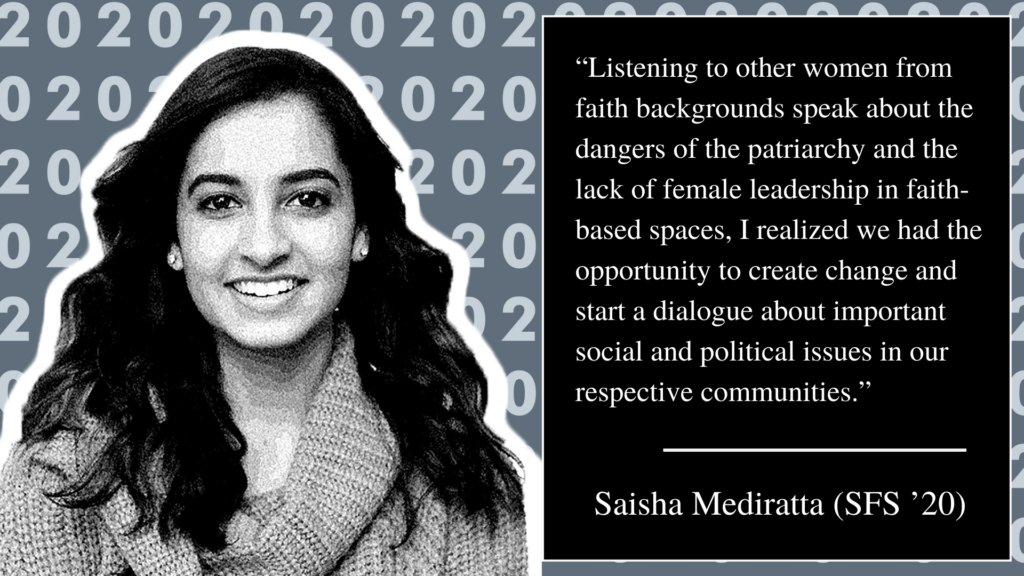At Georgetown University, community comes in the most unique places when it’s needed most. I found one such community on a day retreat at the Calcagnini Contemplative Center during my freshman year. Surrounded by 20 women I didn’t know, I sobbed into the arms of a kind senior. Four years later, I was that senior when someone else needed a shoulder to cry on as we concluded the fourth annual Women in Faith Retreat. This group was a collection of women grappling with questions of faith: the flaws of institutions, the choices we made that felt at odds with certain doctrine, the complex role of family and more. No matter our faith background or lack thereof, there was a sense of solidarity and understanding I have not experienced elsewhere. As I close out my very untraditional senior year, I am of course grateful and appreciative of my education and the opportunities I was presented. More importantly, though, I am indebted to the conversations and the friendships I have built on this campus that push me to reflect more deeply and do better by my communities.
I came to Georgetown with little interest in engaging with faith despite being at a Jesuit institution. My South Asian heritage is intrinsically tied to religious holidays and concepts, making the detachment I initially thought I wanted impossible. I joined GU Jawani, our bhangra team, signed up for Rangila, and started going to Sunday Arati services for some familiarity. My dance captain at the time — one of the co-founders of WIF — encouraged me to sign up for the first-ever WIF Retreat. As a struggling freshman, I welcomed an opportunity for free food and time off-campus. A simple exercise by Shiva Subbaraman, the director of the LGBTQ Resource Center at the time, and a personal talk from Rev. Olivia Lane completely shifted my complacent approach toward these conversations. They helped me realize I had the opportunity to engage with parts of my complex identity in a forum and with resources I had never been privy to in the suburbs of Atlanta. As a culturally Hindu, Indian, immigrant woman, I felt as though some of my identities were at odds, and I felt alone. However, listening to other women from faith backgrounds speak about the dangers of the patriarchy and the lack of female leadership in faith-based spaces, I realized we had the opportunity to create change and start a dialogue about important social and political issues in our respective communities.
One of the most important conversations I have had in my time here sounds like the beginning of a great joke. What do you get when you put two Catholics and two Hindus in a room and ask them to talk about sex? In the fall of my senior year, I had the incredible honor of co-moderating a talk called “Desire, Pleasure, and Faith” organized by Subbaraman, whom I had already admired since that retreat freshman year, in conversation with Brahmachari Sharan, the Dharmic Chaplain, and Fr. Gerard McGlone, S.J., one of our wonderful Jesuits. The conversation centered around the complex relationship between desire and religion: the taboo, the shame and the realities. By talking about the Kama Sutra, the deep harms caused by an aversion to this discussion in faith spaces, priest abuse and the role and acceptance of queer communities in the Catholic Church, we started a dialogue I believe will continue at Georgetown in meaningful ways for those people who seek it.
Georgetown has given me an invaluable opportunity I am not sure I will ever get anywhere else or at another time in my life. Sunday services became not only a place to reminisce about home-cooked food and family, but also a place to have discussions about mental health, global affairs or even our role as the next generation from a common starting point. I was able to attend services of another faith and engage with resources willing to explain and debate the meaning behind practices and doctrine to a complete outsider. WIF allowed me to spend time working on myself — time I would not have taken independently — to reflect more deeply on my values, my communities and the changes I want to see. As a washed-up senior, my simple message is to take advantage of these chances and engage in these conversations. I truly believe these moments are what make Georgetown so special, and they are what I will always carry with me.
Saisha Mediratta is a senior in the School of Foreign Service















L Stern • May 14, 2020 at 1:55 pm
Saisha – your insightful viewpoint highlights the often unknown, or often underappreciated, education of the individual outside the classroom that happens at Georgetown. Thanks to the dedication and acumen of specific university religious, administrators, and staff, students begin a lifetime of engagement in these dialogues with others and especially with themselves. Thank you for sharing your experience, development, and awareness with all of us.